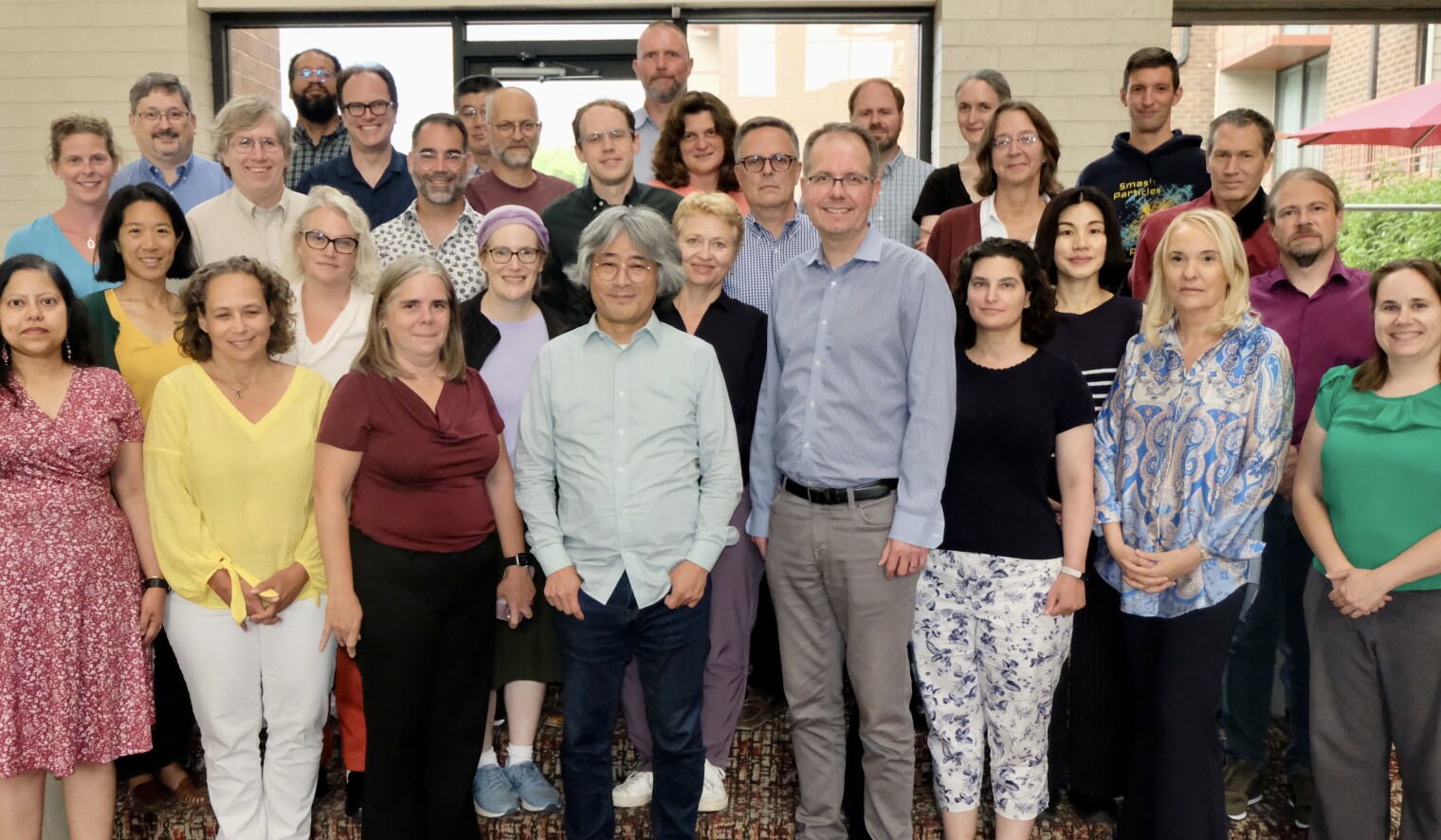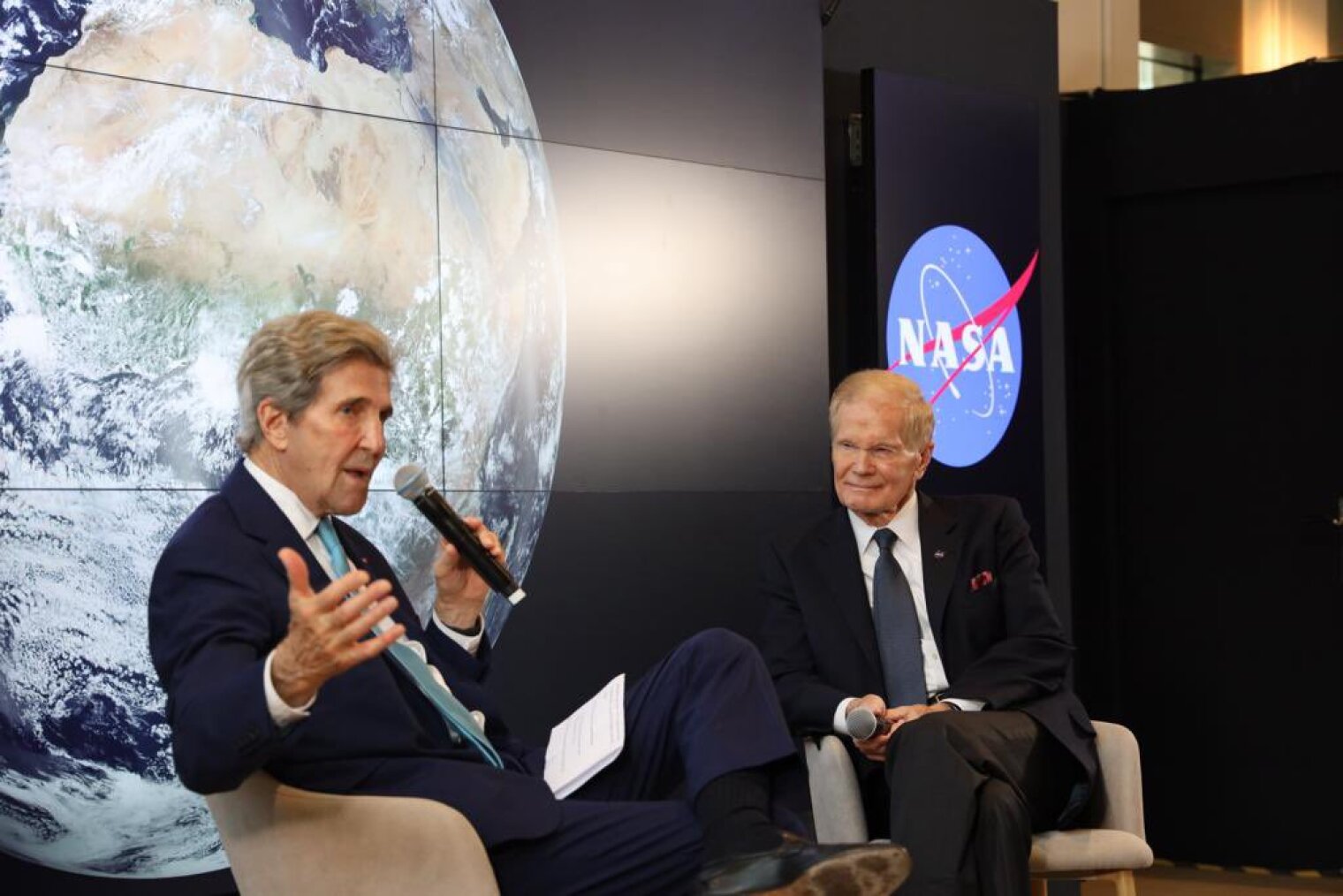| |
| FYI: Science Policy News from AIP |
| THIS WEEK |
|
|
|
|
|
|
| What’s Ahead |
 |
| Members of the Particle Physics Project Prioritization Panel. (usparticlephysics.org) |
Particle Physicists to Present Strategy for Next Decade
The High Energy Physics Advisory Panel is meeting on Thursday and Friday to review and vote on the report from the Particle Physics Project Prioritization Panel (P5), culminating a two-year process to develop a strategy for U.S. particle physics research over the next decade. The report will propose a budget-constrained research agenda for the Department of Energy and National Science Foundation that advances the scientific priorities identified by last summer’s “Snowmass” community study, which distilled contributions from thousands of scientists into a set of consensus recommendations. The P5 report will complement HEPAP’s recent “benchmarking” study and a forthcoming National Academies survey of elementary particle physics. The last P5 report was published in 2014.
Bill to Expand Foreign Funding Disclosures up for House Vote
The House plans to vote this week on legislation that would introduce stricter reporting standards for academics and institutions that receive foreign funding. The Defending Education Transparency and Ending Rogue Regimes Engaging in Nefarious Transactions (DETERRENT) Act would lower the current reporting threshold for institutions from $250,000 to $50,000 for gifts from most countries, with a $0 threshold for “countries of concern,” such as China and Iran. Individual academics working at institutions that receive more than $50 million annually in federal R&D funds would be required to report any gifts they receive from foreign entities and any contracts worth $5,000 or more, with the threshold decreasing to $0 for countries of concern. The bill was passed with amendments by the House Education and Workforce Committee on Nov. 8 by a vote of 27-11. Committee Democrats mostly voted against passing the bill or did not vote, except for three who voted in favor: Reps. Susan Wild (D-PA), Joe Courtney (D-CT), and Kathy Manning (D-NC). Committee Ranking Member Bobby Scott (D-VA) has argued the bill would have a chilling effect on international research collaboration and has offered an alternative proposal for tightening disclosures.
Congress Searches for Compromise on Annual Defense Bill
The House and Senate are seeking to reach a compromise as early as this week on the annual National Defense Authorization Act, which updates policy across the Department of Defense and the National Nuclear Security Administration. Congress has passed the legislation for 62 consecutive years and it is also often used as a vehicle to enact priority policy measures for agencies outside the typical scope of the NDAA. This year, the legislation has been bogged down in part by provisions in the House’s version of the bill that would restrict DOD workforce diversity initiatives. The Senate’s version also includes some restrictions on diversity programs but they are less far-reaching and the bill passed the chamber with bipartisan support. There are also many disputes over lower-profile provisions that must be resolved, including a proposal by the House to greatly expand disclosure requirements for researchers funded by DOD. The White House has stated it “strongly opposes” the proposal.
|
|
| In Case You Missed It |
 |
| U.S. Presidential Envoy for Climate John Kerry and NASA Administrator speak at the COP28 climate change conference in Dubai. (State Department) |
US Rolls out Climate Change Mitigation Initiatives at COP28
With COP28, the annual UN Climate Change Conference, underway in Dubai, the Biden administration has announced a variety of new monitoring and mitigation initiatives. On Monday, NASA unveiled the U.S. Greenhouse Gas Center, an interagency hub for greenhouse gas datasets and analysis tools. Built in collaboration with the Environmental Protection Agency, National Oceanic and Atmospheric Administration, and National Institute of Standards and Technology, it will host a curated catalog of satellite, airborne, and ground-based observations and provide estimates of emissions from human activities, natural sources, and large methane events. The center is a cornerstone of the national greenhouse gas monitoring system outlined in a report released by the administration last week. The report recommends a phased strategy for integrating various monitoring activities to ensure “comprehensive, granular, and timely data,” beginning with a variety of sector-specific demonstration projects and two urban-scale prototype monitoring systems covering the Washington, D.C., and Indianapolis, Indiana, regions.
Separately, the EPA issued a final rule last week that places new regulations on methane emissions from the oil and natural gas industry, which it estimates will reduce methane emissions by nearly 80%. The administration also outlined an international strategy for fusion energy development, calling for new multilateral R&D partnerships, the development of global fusion supply chains, and coordination of fusion regulatory frameworks.
NASA Announces New Heliophysics Director
NASA announced last week that Joseph Westlake will be the new director of its Heliophysics Division starting Jan. 16. Westlake takes the helm from Deputy Director Peg Luce, who has been running the division since NASA promoted Nicky Fox to lead the Science Mission Directorate in February. Westlake comes to the role after 12 years at the Johns Hopkins Applied Physics Laboratory, where he most recently worked on the Interstellar Mapping and Acceleration Probe mission and served as the principal investigator for the Plasma Instrument for Magnetic Sounding that will be included on the Europa Clipper spacecraft. He holds a doctorate in physics from the University of Texas.
Dragonfly Delayed Due to Budget Uncertainty
NASA is delaying its Dragonfly mission by one year due to anticipated shortfalls in the agency’s fiscal year 2024 budget. The delay came as the mission received approval to move to its final design and fabrication stage, but NASA also postponed the final confirmation of the mission to mid-2024. This is not the first time the mission has been pushed back, with a previous delay in 2020 also ascribed to budget limitations. Dragonfly is now set to launch in July 2028 for Saturn’s moon Titan, where it will aerially explore the densely clouded moon. Dragonfly is part of the New Frontiers program, which is the most expensive class of planetary science mission that NASA opens to a competitive mission-selection process. NASA originally planned to solicit proposals for the program’s next mission by the end of this year, but in August the agency pushed back that move to at least 2026, again citing budgetary constraints. Speaking about the Dragonfly delay, Planetary Science Division Director Lori Glaze said the division’s highest immediate priority is ensuring that the flagship Europa Clipper mission meets its launch window next fall.
Quantum and Commercial Space Bills Advance in House
Last week, the House Science Committee passed the National Quantum Initiative Reauthorization Act on a unanimous vote and the Commercial Space Act on a vote of 21-17. The committee adopted 19 amendments to the quantum bill on voice votes, including provisions directing federal agencies to consider how AI and machine learning could be used in quantum science, prioritizing quantum R&D in the healthcare space, and directing the National Science and Technology Council to compare federal initiatives and research strategies with those made by other nations. The Commercial Space Act aims to streamline the process for regulating commercial space activities, but differs significantly from the regulatory framework recently proposed by the White House. Committee Ranking Member Zoe Lofgren (D-CA) stated that Democrats have some concerns about the bill but pledged to work with Republicans as it proceeds. The committee adopted six amendments to the bill on voice votes, including provisions requiring a study on the viability of space-based solar power technology and directing NASA and the Department of Commerce to consider establishing an educational institute to support research on space resources.
|
|
| Upcoming Events |
All times are Eastern Daylight Time, unless otherwise noted. Listings do not imply endorsement. Events beyond this week are listed on our website.
Monday, December 4
Tuesday, December 5
Wednesday, December 6
Thursday, December 7
Friday, December 8
Monday, December 11
Know of an upcoming science policy event either inside or outside the Beltway? Email us at fyi@aip.org.
|
|
| Opportunities |
|
Deadlines indicated in parentheses.
We’re Hiring!
FYI is accepting applications for our new science policy internship. This part-time internship will run in the spring of 2024 for 14 weeks and is open to current undergraduate and graduate students. FYI interns are provided a stipend and gain hands-on experience reporting on federal policy developments. Interns must reside in the Washington, D.C. area during the internship.
Job Openings
Solicitations
Know of an opportunity for scientists to engage in science policy? Email us at fyi@aip.org.
|
|
| Around the Web |
|
News and views currently in circulation. Links do not imply endorsement.
White House
Congress
Science, Society, and the Economy
Education and Workforce
Research Management
Labs and Facilities
Computing and Communications
Space
Weather, Climate, and Environment
Energy
Defense
Biomedical
International Affairs
|
|
|
| |
| This message is sent to you because your email address is on our subscribers list. To manage your FYI preferences and subscriptions, please click here . Or you can unsubscribe from all emails from AIP. AIP, 1 Physics Ellipse, MD 20740-3841
301.209.3100 - newsletters@aipcomm.org As a 501(c)(3) non-profit, AIP is a federation that advances the success of our Member Societies and an institute that engages in research and analysis to empower positive change in the physical sciences. The mission of AIP (American Institute of Physics) is to advance, promote, and serve the physical sciences for the benefit of humanity. |
|
| © 2024. American Institute of Physics |
|
|